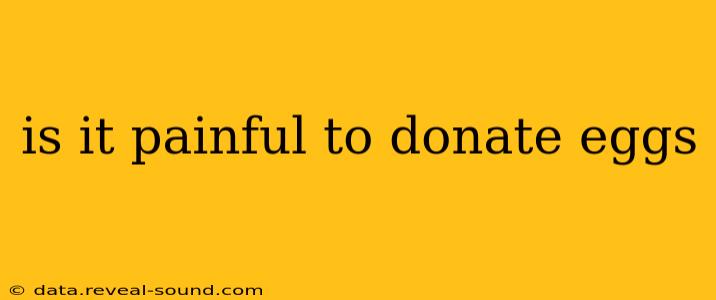Donating eggs is a deeply personal decision, and understanding the process, including potential discomfort, is crucial. While many women successfully donate eggs without major complications, it's essential to be well-informed about the potential for pain and discomfort. This guide aims to provide comprehensive answers to your questions regarding the pain associated with egg donation.
What is the Egg Donation Process?
Before discussing pain, let's briefly outline the egg donation process. It typically involves several stages:
- Initial Screening and Counseling: This involves medical evaluations, psychological assessments, and detailed discussions about the risks and benefits.
- Hormonal Stimulation: Medications are administered to stimulate the ovaries to produce multiple eggs. This is a crucial step and can lead to some side effects.
- Egg Retrieval: A minor surgical procedure under sedation or anesthesia is performed to retrieve the eggs from the ovaries. This is the stage where most women experience discomfort.
- Recovery: After the retrieval, there's a recovery period during which women might experience some discomfort or side effects.
Is Egg Retrieval Painful?
The egg retrieval procedure itself is generally not painful during the process due to the use of sedation or anesthesia. Many women describe feeling relaxed and comfortable during the procedure. However, the experience is different for every woman, and some may feel some pressure or cramping.
What Kind of Discomfort Can I Expect After Egg Retrieval?
Post-procedure discomfort is more common than pain during the retrieval itself. This can include:
- Cramping: Mild to moderate cramping is quite common in the abdomen and pelvis for a few days following the procedure. Over-the-counter pain relievers like ibuprofen can usually manage this.
- Bloating: Hormonal changes and the retrieval process itself can cause bloating and a feeling of fullness.
- Ovarian Hyperstimulation Syndrome (OHSS): This is a rare but serious complication that involves the ovaries becoming enlarged and causing severe pain, bloating, and other symptoms. Medical professionals carefully monitor for OHSS, and it's usually manageable with proper treatment.
What About the Hormonal Stimulation Phase?
The hormonal stimulation phase, prior to egg retrieval, can also bring some discomfort for some women. Side effects may include:
- Breast tenderness: Hormonal changes can cause breast swelling and tenderness.
- Mood swings: The fluctuation in hormones can impact mood and cause emotional changes.
- Headaches: Some women experience headaches during stimulation.
- Ovarian pain: Some women might experience mild to moderate pain in the ovaries during the stimulation phase.
How Can I Minimize Discomfort During Egg Donation?
Several strategies can help minimize discomfort:
- Open communication with your medical team: Discuss any concerns or anxieties with your doctor and nurses throughout the process.
- Following instructions carefully: Adhere strictly to the medication schedule and other instructions provided by your medical team.
- Rest and relaxation: Prioritize rest and relaxation, particularly after the egg retrieval procedure.
- Pain management: Over-the-counter pain relievers, such as ibuprofen or acetaminophen, can help manage mild to moderate pain and cramping.
- Hydration: Staying adequately hydrated helps prevent bloating and other side effects.
Are There Any Long-Term Pain Issues Associated with Egg Donation?
In the vast majority of cases, any pain or discomfort associated with egg donation is temporary and resolves within a few days to weeks. Long-term pain complications are rare. However, it's important to report any persistent or concerning pain to your doctor.
Is Egg Donation Worth It Despite the Potential Discomfort?
The decision to donate eggs is intensely personal and should be made after careful consideration of the potential benefits and risks. While there's potential for discomfort, many women find the experience rewarding and empowering, knowing they're helping others build their families.
This article provides general information and should not be considered medical advice. Always consult with a healthcare professional for personalized guidance and support.
